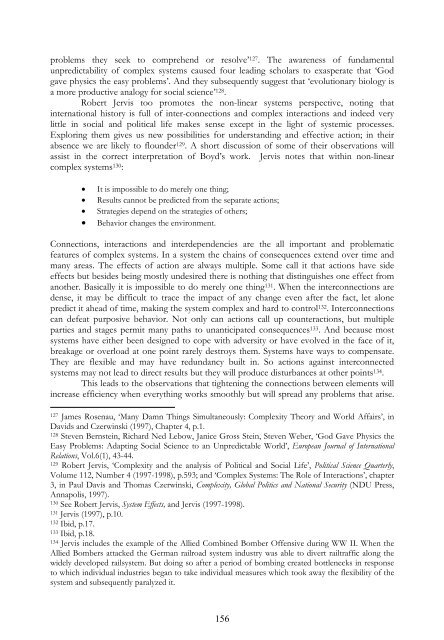Science, Strategy and War The Strategic Theory of ... - Boekje Pienter
Science, Strategy and War The Strategic Theory of ... - Boekje Pienter
Science, Strategy and War The Strategic Theory of ... - Boekje Pienter
You also want an ePaper? Increase the reach of your titles
YUMPU automatically turns print PDFs into web optimized ePapers that Google loves.
problems they seek to comprehend or resolve’ 127 . <strong>The</strong> awareness <strong>of</strong> fundamentalunpredictability <strong>of</strong> complex systems caused four leading scholars to exasperate that ‘Godgave physics the easy problems’. And they subsequently suggest that ‘evolutionary biology isa more productive analogy for social science’ 128 .Robert Jervis too promotes the non-linear systems perspective, noting thatinternational history is full <strong>of</strong> inter-connections <strong>and</strong> complex interactions <strong>and</strong> indeed verylittle in social <strong>and</strong> political life makes sense except in the light <strong>of</strong> systemic processes.Exploring them gives us new possibilities for underst<strong>and</strong>ing <strong>and</strong> effective action; in theirabsence we are likely to flounder 129 . A short discussion <strong>of</strong> some <strong>of</strong> their observations willassist in the correct interpretation <strong>of</strong> Boyd’s work. Jervis notes that within non-linearcomplex systems 130 :It is impossible to do merely one thing;Results cannot be predicted from the separate actions;Strategies depend on the strategies <strong>of</strong> others;Behavior changes the environment.Connections, interactions <strong>and</strong> interdependencies are the all important <strong>and</strong> problematicfeatures <strong>of</strong> complex systems. In a system the chains <strong>of</strong> consequences extend over time <strong>and</strong>many areas. <strong>The</strong> effects <strong>of</strong> action are always multiple. Some call it that actions have sideeffects but besides being mostly undesired there is nothing that distinguishes one effect fromanother. Basically it is impossible to do merely one thing 131 . When the interconnections aredense, it may be difficult to trace the impact <strong>of</strong> any change even after the fact, let alonepredict it ahead <strong>of</strong> time, making the system complex <strong>and</strong> hard to control 132 . Interconnectionscan defeat purposive behavior. Not only can actions call up counteractions, but multipleparties <strong>and</strong> stages permit many paths to unanticipated consequences 133 . And because mostsystems have either been designed to cope with adversity or have evolved in the face <strong>of</strong> it,breakage or overload at one point rarely destroys them. Systems have ways to compensate.<strong>The</strong>y are flexible <strong>and</strong> may have redundancy built in. So actions against interconnectedsystems may not lead to direct results but they will produce disturbances at other points 134 .This leads to the observations that tightening the connections between elements willincrease efficiency when everything works smoothly but will spread any problems that arise.127 James Rosenau, ‘Many Damn Things Simultaneously: Complexity <strong>The</strong>ory <strong>and</strong> World Affairs’, inDavids <strong>and</strong> Czerwinski (1997), Chapter 4, p.1.128 Steven Bernstein, Richard Ned Lebow, Janice Gross Stein, Steven Weber, ‘God Gave Physics theEasy Problems: Adapting Social <strong>Science</strong> to an Unpredictable World’, European Journal <strong>of</strong> InternationalRelations, Vol.6(1), 43-44.129 Robert Jervis, ‘Complexity <strong>and</strong> the analysis <strong>of</strong> Political <strong>and</strong> Social Life’, Political <strong>Science</strong> Quarterly,Volume 112, Number 4 (1997-1998), p.593; <strong>and</strong> ‘Complex Systems: <strong>The</strong> Role <strong>of</strong> Interactions’, chapter3, in Paul Davis <strong>and</strong> Thomas Czerwinski, Complexity, Global Politics <strong>and</strong> National Security (NDU Press,Annapolis, 1997).130 See Robert Jervis, System Effects, <strong>and</strong> Jervis (1997-1998).131 Jervis (1997), p.10.132 Ibid, p.17.133 Ibid, p.18.134 Jervis includes the example <strong>of</strong> the Allied Combined Bomber Offensive during WW II. When theAllied Bombers attacked the German railroad system industry was able to divert railtraffic along thewidely developed railsystem. But doing so after a period <strong>of</strong> bombing created bottlenecks in responseto which individual industries began to take individual measures which took away the flexibility <strong>of</strong> thesystem <strong>and</strong> subsequently paralyzed it.156
















